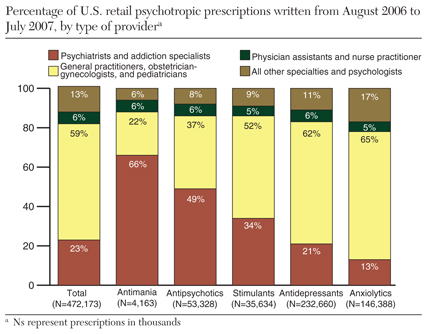Psychotropic drug prescriptions by medical specialty
Prescribing of psychotropic medications by nonpsychiatrists improves access to treatment but raises questions about adherence to evidence-based guidelines, provision of psychotherapy, adequacy of medication monitoring, and appropriateness of treatment intensity.
General practitioners play a role in prescribing antidepressant medications and treating depression, but the extent to which they prescribe other psychotropic medications has received less emphasis. Prescribing of psychotropic medications by nonpsychiatrists improves access to treatment but raises questions about adherence to evidence-based guidelines, provision of psychotherapy, adequacy of medication monitoring, and appropriateness of treatment intensity.
In 2004-2005, about two-thirds of primary care physicians reported that they were unable to obtain outpatient mental health services for patients. Given the large role of primary care providers in psychotropic drug prescribing, additional efforts may be needed to enhance the quality of psychiatric treatment in general practice settings across a range of psychiatric conditions.

The Figure used data from August 2006 to July 2007 from the IMS National Prescription Audit Plus database, which collects transaction information from approximately 36,000 retail pharmacies (70% of all pharmacies). Using a separate sample of retail pharmacy transactions that includes physicians' Drug Enforcement Administration numbers, IMS assigns physician specialty information to obtain an estimate of the total number of prescriptions filled in retail pharmacies by medical specialty.




